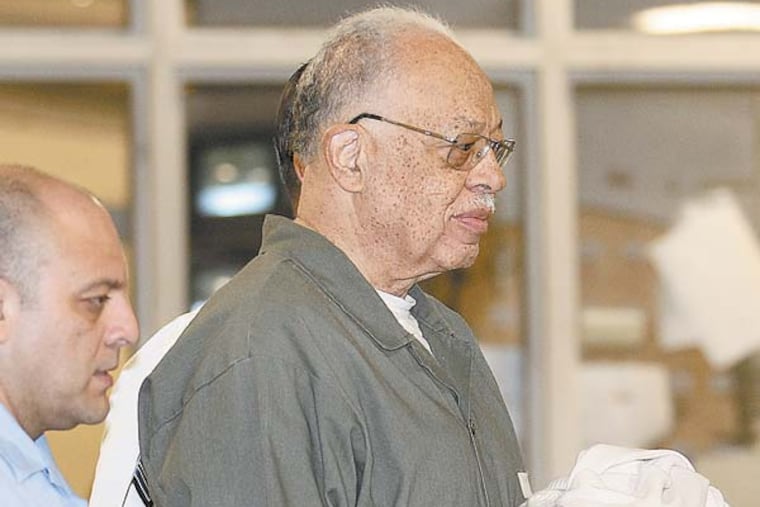Juror on Gosnell: 'Something went wrong in his mind'
For eight weeks, they endured some of the most graphic images and gruesome testimony ever aired in a Philadelphia courtroom.

For eight weeks, they endured some of the most graphic images and gruesome testimony ever aired in a Philadelphia courtroom.
Then they spent nine days behind closed doors, poring over evidence from hundreds of abortions and debating if Kermit Gosnell was a murderer or a martyr.
When they were finally discharged Wednesday, the jurors who convicted him said they were spent but relieved - and were certain their verdicts were sound. More than anything, the foreman said, the jury became convinced that Gosnell knew he was killing babies at his West Philadelphia clinic, but didn't care.
"Premeditation," foreman David Misko said when asked what struck them the most. "That this was business as usual, that he snipped the necks no matter what happened."
Minutes after Gosnell was sentenced to consecutive life prison terms for the deaths of three infants, Misko and two other jurors, Sarah Glinski and Joseph Carroll, gave a waiting media throng its first glimpse inside the deliberations.
They said they were stunned, but not overwhelmed, by the graphic nature of the case. They said they didn't discuss their own opinions about abortion in the jury room or even know where one another stood on it.
And they said that they believed the doctor had once practiced medicine with the best of intentions, but took a frightening and ultimately deadly turn along the way.
"I think somewhere, something went wrong in his mind," said Glinski, 23.
Carroll pointed to the root of most crimes: Money.
"Most of us felt it came down to a greed factor, that his service was just like a machine," Carroll said. "You came in, [paid] for a service, and you were gone."
Two mentioned Gosnell's decision not to testify or mount much of a defense, and his odd demeanor at times during the trial.
"He just sat there and smirked for eight weeks," said Misko, a 27-year-old who said he works in the health-care industry. "The guy's fighting for his life, and just sits back and smirks?"
Still, he said, that didn't play a role in the verdict.
Carroll said he wasn't sure he would have voted to execute Gosnell, predicting the 72-year-old doctor will not live long anyway. Prosecutors weighed the same factor when they agreed to the life terms if Gosnell pledged not to appeal.
But the 46-year-old Carroll said he was among some jurors who believed patients who sought the illegal abortions should also have been charged.
"A lot of discussion was that the mothers, it should be their fault, too, for such late-term babies," he said.
Their discussion was never overheated or divisive, the jurors said.
Glinski described herself as pro-choice. But she said she was able to detach her feelings about the issue and that the topic didn't come up during deliberations.
That congeniality was apparent during the trial. In court, the group often seemed upbeat and friendly. Court personnel said jurors made themselves at home in the deliberation room, bringing in snacks and making coffee.
When it ended, they asked to pose for photos with the lawyers and Common Pleas Court Judge Jeffery P. Minehart. And though he disagreed with their finding, Gosnell instructed his lawyer, Jack McMahon, to personally thank the jurors for their work, McMahon said.
That work included individually inspecting the medical charts related to 227 illegal abortions.
"This was a tremendous group of jurors," Assistant District Attorney Edward Cameron told reporters at a news conference.
The jurors were bombarded with hundreds of photos from the clinic, including images of aborted fetuses. Minutes before Gosnell's sentencing Wednesday, court personnel wheeled out of the room a bloodstained lounge chair that for weeks sat just feet from the jury box.
Though none seemed to register shock or disgust at the evidence, the images will linger, they said.
Minehart arranged to have free counseling available for jurors after the case. Carroll said he might consider talking to someone about the experience.
Misko agreed the case was "emotionally tolling" for the panel, but said it was not likely to shape his own views. He said Gosnell's attempt to portray himself as a martyr was "delusional," given the evidence.
In the end, he said, the case was less about abortion than about murder.
Said Misko: "He's the worst example of an abortion doctor in the world, obviously."
>Inquirer.com
District attorney and jurors speak about the case. See videos at www.inquirer.com/gosnellEndText
Inquirer staff writers Joseph A. Slobodzian and Sulaiman Abdur-Rahman contributed to this article.